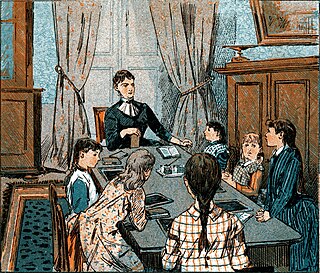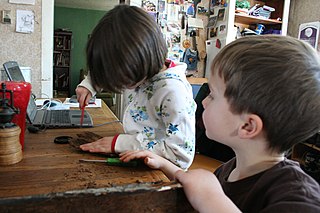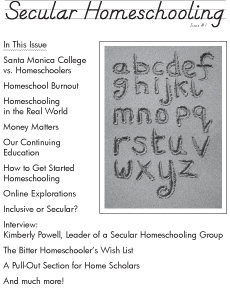Related Research Articles

Homeschooling or home schooling, also known as home education or elective home education (EHE), is the education of school-aged children at home or a variety of places other than a school. Usually conducted by a parent, tutor, or online teacher, many homeschool families use less formal, more personalized and individualized methods of learning that are not always found in schools. The actual practice of homeschooling can vary. The spectrum ranges from highly structured forms based on traditional school lessons to more open, free forms such as unschooling, which is a lesson- and curriculum-free implementation of homeschooling. Some families who initially attended a school go through a deschool phase to break away from school habits and prepare for homeschooling. While "homeschooling" is the term commonly used in North America, "home education" is primarily used in Europe and many Commonwealth countries. Homeschooling should not be confused with distance education, which generally refers to the arrangement where the student is educated by and conforms to the requirements of an online school, rather than being educated independently and unrestrictedly by their parents or by themselves.

Unschooling is an informal learning method that prioritizes learner-chosen activities as a primary means for learning. Unschoolers learn through their natural life experiences including play, household responsibilities, personal interests and curiosity, internships and work experience, travel, books, elective classes, family, mentors, and social interaction. Often considered a lesson- and curriculum-free implementation of homeschooling, unschooling encourages exploration of activities initiated by the children themselves, under the belief that the more personal learning is, the more meaningful, well-understood, and therefore useful it is to the child. While unschooled students may occasionally take courses, unschooling questions the usefulness of standard curricula, fixed times at which learning should take place, conventional grading methods and standardized tests, forced contact with children in their own age group, the compulsion to do homework regardless of whether it helps the learner in their individual situation, the effectiveness of listening to and obeying the orders of one authority figure for several hours each day, and other features of traditional schooling.
Home education in the United Kingdom of Great Britain and Northern Ireland is often termed "elective home education" ("EHE") to signify the independent nature of practice from state provisions such as education for children with ill-health provided by the local authority in the family home. EHE is a collective term used in the UK to describe education provided other than through the schooling system. Parents have a duty to ensure their children are educated but the education legislation in England and Wales does not differentiate between school attendance or education otherwise than at school. Scots education legislation on the other hand differentiates between public (state) school provision and education "by other means", which includes both private schooling and home education. The numbers of families retaining direct responsibility for the education of their children has steadily increased since the late 1970s. This increase has coincided with the formation of support groups such as Education Otherwise. Home education may involve an informal style of education described as unschooling, informal learning, natural or autonomous learning. Others prefer to retain a structured school at home approach sometimes referred to as homeschooling although the terms are often interchanged.
Alternative education encompasses many pedagogical approaches differing from mainstream pedagogy. Such alternative learning environments may be found within state, charter, and independent schools as well as home-based learning environments. Many educational alternatives emphasize small class sizes, close relationships between students and teachers and a sense of community.
The education system in Tasmania comprises the education of children from their early years, through kindergarten, primary and high school, and tertiary education in universities and vocational education and training organisations. The system is delivered by the government-run K-12 schooling system, and numerous independent schools and colleges, most of which are controlled or sponsored by religious organisations. Public education in Tasmania is managed primarily by the Tasmanian Department of Education. The Department is responsible for all aspects of education in Tasmania including schooling, adult education, the State Library and TasTAFE, a vocational tertiary institution with many campuses around the state.
Deschooling is a term invented by Austrian philosopher Ivan Illich. Today, the word is mainly used by homeschoolers, especially unschoolers, to refer to the transition process that children and parents go through when they leave the school system in order to start homeschooling. The process is a crucial basis for homeschooling to work. It involves children gradually transitioning away from their schoolday routine and institutional mentality, redeveloping the ability to learn via self-determination, and discovering what they want to learn in their first homeschool days.

The Home School Legal Defense Association (HSLDA) is a United States-based organization that seeks to aid homeschooling families through legal representation. HSLDA describes itself as a "Christian organization."

Homeschooling constitutes the education of about 3.4% of U.S. students as of 2012. The number of homeschoolers in the United States has increased significantly over the past few decades since the end of the 20th century. In the United States, the Supreme Court has ruled that parents have a fundamental right to direct the education of their children. The right to homeschool is not frequently questioned in court, but the amount of state regulation and help that can or should be expected continues to be subject to legal debate.
Peter Kowalke is an American unschooling advocate best known for his work on grown homeschoolers and the lasting influence of homeschooling. He was one of the first authors to explore the lasting influence that homeschooling has on a person in terms of identity, and produced a large body of work on the topic from 1994 until 2013, after which he stepped back from the homeschooling community to focus on contextualizing the Indian Advaita Vedanta philosophy for American culture.
Generation Joshua, often called "GenJ" by its members, is an American Christian fundamentalist youth organization founded in 2003 that aims to encourage youth participation in government, civics, and politics toward conservative Christian values. GenJ is a division of the Home School Legal Defense Association, which is a non-profit 501(c)3 organization, based in Purcellville, Virginia. The organization was founded by Michael Farris and Mike Smith and is located on the campus of Patrick Henry College.
Single-parent homeschooling is the practice of conducting homeschool by a parent who may be the sole breadwinner for the family. According to the peer-review journal Education Policy Analysis, based on the findings of the National Household Education Survey, of the National Center of Educational Statistics, between 1994 and 1999 the number of single-parent homeschools almost doubled. No further statistics are currently available. It is the general perception, by most homeschooling advocates, that most single-parent homeschools are led by a self-employed single parent, one that is receiving public assistance, or someone that has received a life insurance settlement. In some single-parent homeschool circles it is thought that most-single parent homeschools are run by parents who work full-time jobs outside the home. No statistics have been compiled to confirm or invalidate either supposition.

Secular Homeschooling was an American magazine for people who homeschool for reasons other than religion. It began as a quarterly, but became a bimonthly in July 2009. The magazine is no longer published and the final issue was released in 2011.
The legality of homeschooling in India and a plethora of alternative education schools spread over different states has been debated by educators, lawmakers, and parents since the passing of the Right of Children to Free and Compulsory Education Act (RTE) which makes formal education a fundamental right of every child between the ages of 6 and 14 and specifies minimum norms for schools. While the legality of homeschooling still remains a grey area, there have been petitions by parents and alternate schools in the past for granting relief. As per the Universal Declaration of Human Rights to which India is a signatory, quote: "Parents have a prior right to choose the kind of education that shall be given to their children."

Homeschooling is legal in many countries. Countries with the most prevalent homeschooling movements include Australia, Canada, New Zealand, the United Kingdom, and the United States. Some countries have highly regulated homeschooling programs as an extension of the compulsory school system; few others, such as Germany, have outlawed it entirely. In some other countries, while not restricted by law, homeschooling is not socially acceptable, or is considered undesirable, and is virtually non-existent.
Homeschooling in New Zealand is legal. The Ministry of Education reports annually on the population, age, ethnicity, and turnover of students being educated at home.

Homeschooling in South Africa had been illegal, until it was recognized in 1996 under the South African School Legislation, since then it has grown significantly.
Marilyn Mosley Gordanier is an American educator, speaker, author, and founder of the Laurel Springs School. She is known for creating the first online K-12 school in the United States, Japan, and Korea. In 1996, the Today Show's Bryant Gumbel deemed the Laurel Springs School the "wave of the future." She is an advocate for girl's education worldwide and co-founded Educate Girls Now to raise awareness of the dire conditions of underprivileged Afghanistan girls and to ensure they receive an education and are not forced into early marriage.
There was a resurgence of homeschooling during the COVID-19 pandemic to help students return to school. Innovative parents sought to create solutions to their individual dilemmas by organizing local groups. These variations of homeschooling include micro schools and educational family co-ops. The first usually involves hired professionals to teach a small group of kids. The second is a parent-organized co-operative where families take turns educating and minding their kids during the week. Both are largely available only to the well-off, as costs in time and money are high. 'Pandemic pod' is the fashionable term used to describe one of these arrangements where all group members agree to participate under well-defined and strictly enforced health rules.
In Canada, homeschooling has increased in popularity since the advent of the 21st century. It is legal in every province, with each province having its own regulations around the practice. In some provinces, funding is available. In 2016, the number of homeschooled children in Canada was approximately 60,000 ; this corresponds to approximately one in every 127 school-aged children. In 2020, the average growth rate of the practice amounted to more than 5 per cent per year. Canada has a large proportion of non-religiously motivated homeschoolers compared to some other countries. It is also one of three countries worldwide, along with the United States and South Africa, that hosts an organization with lawyers on staff which serves the legal needs of home educators.
Education in British Columbia comprises public and private primary and secondary schools throughout the province. Like most other provinces in Canada, education is compulsory from ages 6–16, although the vast majority of students remain in school until they graduate from high school at the age of 18. In 2020, 86% of students in British Columbia graduated from high school within six years of entering grade 8. It is also common for children to attend kindergarten at the age of 5, it is increasingly common for even younger children to attend pre-school or early learning programs before their formal school age years.
References
- ↑ English, Rebecca (14 April 2019). "Homeschooling is on the rise in Australia. Who is doing it and why?". The Conversation. Retrieved 2020-12-23.
- 1 2 3 4 5 "Why Is Homeschooling Growing in Australia?". HSLDA. Retrieved 2020-12-23.
- 1 2 3 "Australia Homeschooling Trends Over the Last Decade". HSLDA. Retrieved 2020-12-24.
- 1 2 3 4 "Australia". HSLDA. Retrieved 2020-12-23.
- ↑ White, Michael (January 1982). "Distance education in Australian higher education — a history". Distance Education. 3 (2): 255–278. doi:10.1080/0158791820030207.
- ↑ Hennessy, Kate (18 April 2020). "Home schooling: 'Everyone's finding their feet and we need to be gentle with each other'". The Guardian.
- 1 2 Stacey, Elizabeth (Fall 2005). "The History of Distance Education in Australia". Quarterly Review of Distance Education. 6 (3): 253–259, 293. ERIC EJ875011 ProQuest 231101077.
- ↑ "Online And Distance Education in Australia: Explained | Study in Australia • OzStudies". www.ozstudies.com. Retrieved 2020-12-23.
- ↑ "Education Otherwise" (PDF). Education Otherwise. Archived from the original (PDF) on 2011-05-01. Retrieved 2016-04-03.
- 1 2 3 "HEA Membership Benefit Inclusions". Home Education Association, Inc. Retrieved 5 February 2022.
- ↑ "EDUCATION AND TRAINING REFORM ACT 2006 (NO 24 OF 2006)". Austlii.edu.au. Retrieved 2016-04-03.
- ↑ "Victorian Registration and Qualifications Authority". Vrqa.vic.gov.au. 2016-03-16. Retrieved 2016-04-03.
- ↑ "Untitled Document". Archived from the original on March 12, 2012. Retrieved June 13, 2011.
- ↑ "Home Education Association". Hea.asn.au. Archived from the original on 2011-07-17. Retrieved 2016-04-03.
- 1 2 3 4 "Correspondence School of Victoria – its first 60 years". DEHANZ. 2019-06-11. Retrieved 2020-12-24.
- 1 2 Morrow, Michelle (2019-05-20). "Homeschooling In Australia - What, Why & How". My Homeschool. Retrieved 2020-12-23.
- ↑ Morse, Alyssa R.; Banfield, Michelle; Batterham, Philip J.; Gulliver, Amelia; McCallum, Sonia; Cherbuin, Nicolas; Farrer, Louise M.; Calear, Alison L. (December 2022). "What could we do differently next time? Australian parents' experiences of the short-term and long-term impacts of home schooling during the COVID-19 pandemic". BMC Public Health. 22 (1): 80. doi: 10.1186/s12889-022-12495-4 . PMC 8755513 . PMID 35027020.
- ↑ "LinkedIn".
- ↑ "Home-schooling is on the rise after Covid remote learning period". The Canberra Times. Retrieved 8 August 2021.
- ↑ "Australian Charities and Not-for-profits Commission (ACNC)".
- ↑ "HEA Australia State Support" . Retrieved 5 February 2022.